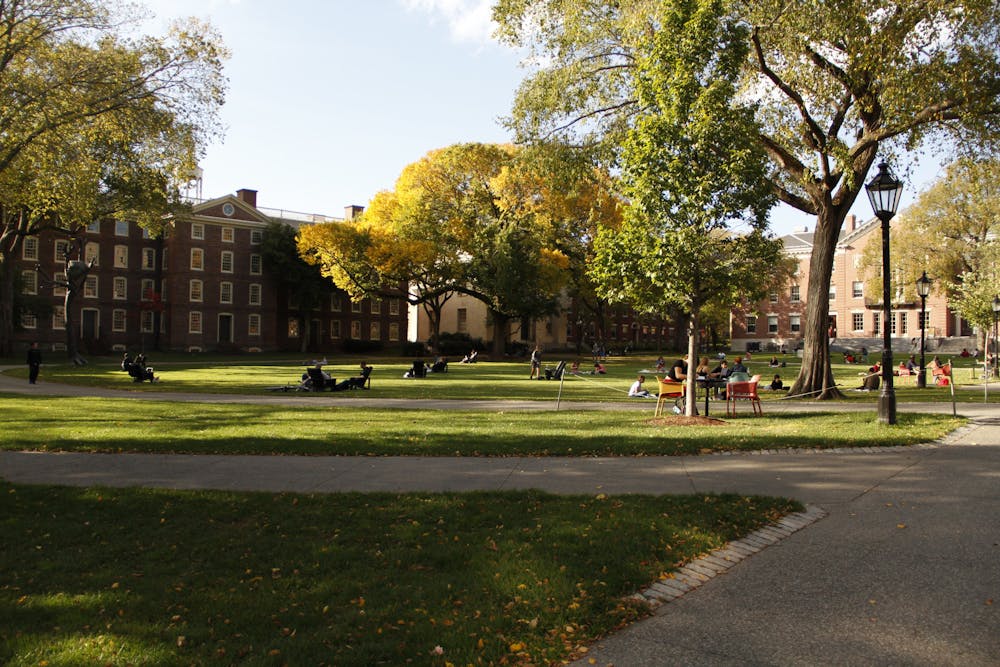A motion to increase the number of faculty members sitting on the Academic Priorities Committee from six to eight passed with a 95% majority at the first faculty meeting of the semester Tuesday.
The motion will be effective starting July 1, 2023. The APC oversees academic programs at the University and makes recommendations to the president about the distribution of resources in support of education and research, according to the APC website.
Kenneth Wong, professor of education policy, political science, public policy and urban studies, introduced the motion on behalf of the Faculty Executive Committee. “Right now, we have eight senior administrators and six faculty members,” Wong said. “The rationale behind this motion is to bring parity and balance to the membership of APC.”
Provost Richard Locke P’18, who has chaired the APC for over seven years, advocated strongly in favor of this motion, saying that an increase in faculty members will lead to more enriched discussions surrounding important committee decisions.
“I am very supportive of increasing the number of faculty who serve on (the APC) because I think it’s really important for the quality of the decisions,” he said. “Having a strong faculty voice and having parity is really good for this committee and for faculty governance in general.”
Fundraising Developments
President Christina Paxson P’19 also announced updates regarding the BrownTogether campaign, a fundraising campaign that will aid the University’s investments in faculty, graduate students and undergraduates.
The University expanded the campaign goal from $3 billion to $4 billion last fall, The Herald previously reported. Paxson shared that the University has already raised more than $400 million since increasing the goal and thanked all “advancement colleagues” and “academic leaders” who have spurred the fund’s growth.
Locke explained that the University aims to use its increased fundraising to enhance research and scholarship on campus.
“We want to make sure that we’re measuring the success of this plan not just by research dollars,” but by the tangible results of ongoing research, he said.
Locke said the University has made efforts to address major faculty concerns relating to research, including giving faculty more time to work, further institutional support and more seed and travel funding.
“We are actually doubling the amount of the Humanities Research Fund(s) so there are more funds available for people to seek grants, ” he added, referencing the program to support research in the arts, humanities and social sciences.
Currently, the University is working closely with the Committee on Faculty Equity and Diversity to update its sabbatical policy by increasing salary support during sabbatical semesters from 75% of salaries to 100%, Locke said. Despite having to work through budget issues for this change, Locke said he remains optimistic on the University’s ability to make this adjustment.
Locke and Paxson plan on further discussing these changes with the Corporation, the University’s highest governing body, and working with the University Resources Committee to put the initiative into effect.
“As important as it is to provide the support, we also want to make sure that the process … is inclusive and transparent,” he added.
Other fundraising updates included the establishment of 123 endowed professorships and the raising of $70 million for international student financial aid, advancing the University on its “path to becoming need-blind for international students,” Paxson said.
University Capital Project Updates
Thomas Roberts, professor of ecology, evolution and organismal biology, provided updates on three residential projects at the University: River House, which will be used for graduate student housing; the Brook Street Dormitory, which is expected to be completed by fall 2023; and the new Health and Wellness Center that opened last year.
The new Lindemann Performing Arts Center is also currently under construction and is expected to be finished in October 2023. Churchill House, home to the Rites and Reason Theatre, also recently began construction to “add a bit of space for housing faculty,” Roberts said. The University is also in the process of reimagining the design of Andrew’s House, which will eventually be home to the Cogut Institute for the Humanities.
Andrew’s House is “going to provide wonderful opportunities broadly for humanities at Brown,” Roberts said.
Roberts also emphasized that the University is prioritizing the health of the community and planet as it executes its new capital projects.
“We’ve made great progress in sustainable building and operations in the last year,” he said, “and we’re going to continue to make that progress.”
COVID-19 Count
Vice President for Campus Life Eric Estes shared the University’s COVID-19 reports for the start of this academic year.
“I’m grateful to report that the weeks of Sept. 19 and Sept. 26 have seen a significant decline in the number of reported cases of COVID by students,” he said. “The overall trend has been downward for the past two and a half weeks, including the start of this week.”
Estes also reported that the University’s COVID numbers “continue to be lower than most of our peer institutions, both last semester and this semester.”
The meeting also included a moment of silence for the passing of Phillip Lieberman, professor of cognitive and linguistic sciences, as well as Geoffrey Ribbans, professor emeritus of Hispanic studies.
Corrections: A previous version of this story mistakenly said that there was a moment of silence for Sheila Blumstein, rather than Geoffrey Ribbans. Additionally, a previous version mistated the name of the Cogut Institute for the Humanities. The Herald regrets the errors.

Sofia Barnett is a University News editor overseeing the faculty and higher education beat. She is a junior from Texas studying history and English nonfiction and enjoys freelancing in her free time.





